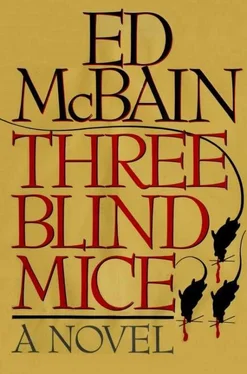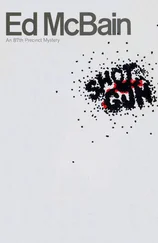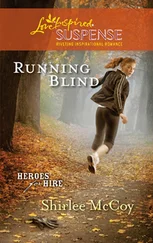Ed McBain - Three Blind Mice
Здесь есть возможность читать онлайн «Ed McBain - Three Blind Mice» весь текст электронной книги совершенно бесплатно (целиком полную версию без сокращений). В некоторых случаях можно слушать аудио, скачать через торрент в формате fb2 и присутствует краткое содержание. Город: New York, Год выпуска: 1990, ISBN: 1990, Издательство: Arcade, Жанр: Полицейский детектив, на английском языке. Описание произведения, (предисловие) а так же отзывы посетителей доступны на портале библиотеки ЛибКат.
- Название:Three Blind Mice
- Автор:
- Издательство:Arcade
- Жанр:
- Год:1990
- Город:New York
- ISBN:978-1559700801
- Рейтинг книги:3 / 5. Голосов: 1
-
Избранное:Добавить в избранное
- Отзывы:
-
Ваша оценка:
- 60
- 1
- 2
- 3
- 4
- 5
Three Blind Mice: краткое содержание, описание и аннотация
Предлагаем к чтению аннотацию, описание, краткое содержание или предисловие (зависит от того, что написал сам автор книги «Three Blind Mice»). Если вы не нашли необходимую информацию о книге — напишите в комментариях, мы постараемся отыскать её.
Three Blind Mice — читать онлайн бесплатно полную книгу (весь текст) целиком
Ниже представлен текст книги, разбитый по страницам. Система сохранения места последней прочитанной страницы, позволяет с удобством читать онлайн бесплатно книгу «Three Blind Mice», без необходимости каждый раз заново искать на чём Вы остановились. Поставьте закладку, и сможете в любой момент перейти на страницу, на которой закончили чтение.
Интервал:
Закладка:
“Did she say that?”
“Not the nobility stuff, that’s mine. But, yes, she said the rest, I’m quoting directly from the Brown Daily Herald . She also said that even the nickname Trish offended her.”
“Touchy.”
“Very. Went to law school at NYU in New York…”
“ Law Review , of course,” Matthew said, and rolled his eyes.
“Surprisingly, no. But top ten percent of the class. Passed the California bar three years later and was hired immediately by a firm called Dolman, Ruggiero, Peters and Dern. Ring a bell?”
“No.”
“Stayed there for two years, earned the nickname Wicked Witch of the West, a sobriquet apparently premised on her courtroom manners. She moved from there to New York, the firm of Carter, Rifkin…”
“… Lieber and Loeb. Bombers.”
“Apparently. That’s where she made her rep.”
“As what?”
“ Really ruthless defense attorney. Strictly criminal law. She’s successfully defended crooked oil company execs, Mafia bosses, Colombian drug dealers, tax fraud specialists…”
“How about murderers?”
“Three. Tough cases, too. One was a woman charged with strangling her six-month-old baby in his crib.”
“What’d she cop to?”
“She didn’t. She went for an acquittal… and got it.”
Matthew looked at him.
“Tough lady,” Andrew said, and nodded.
“What’s her courtroom style like?”
“Flamboyant, seductive, aggressive, unrelenting, and unforgiving. You make one slip and she goes straight for the jugular.”
“When did she cross over?”
“Left Carter, Rifkin for the New York D.A.’s office, worked there for three years before moving here to Florida. Apparently she wasn’t getting where she wanted to go fast enough.”
“Where does she want to go?”
“Washington is my guess. Eventually. With Florida politics as the stepping stone.”
“Like her boss.”
“Yes, sir.”
“Who handed her this one because he’s got even bigger fish to fry. You haven’t seen anything in the paper about that, have you?”
“No, sir. What am I supposed to be looking for?”
“God knows. Have you found me a translator?”
“Yes, sir.”
“Good. Check on the running time of Casablanca for me.”
“ Casablanca , yes, sir.”
“And find out what time the tides came in and went out on the day of the murders.”
“Yes, sir, the tides.”
“What’s the translator’s name?”
Mai Chim Lee had been airlifted out of Saigon in April of 1975, when she was fifteen years old and all was chaos and confusion. She remembered her father rushing her to the embassy through thronged and deafening streets, her sweaty hand clutched in his firm grip, remembered him hoisting her up into the arms of a black American sergeant, the helicopter lifting off, people clinging to the landing skids, clawing for purchase.
She had not seen her father since that day. He had worked for the United States government as a translator; the Vietcong executed him the moment they occupied Saigon. She did not know where her mother was now. Perhaps they had killed her, too. She did not know. Three years later, when Mai Chim was eighteen, her mother stopped answering her letters. A letter from a neighbor, a woman she had called Auntie Tan, said only that her mother had gone away, she did not know where. Mai Chim could only imagine the worst.
She remembered her mother as a woman who smiled a great deal. Out of happiness, she supposed. She remembered her father as a stem disciplinarian who would smash teapots to the floor if his hot tea wasn’t ready and waiting whenever he wanted it. But he’d managed to get her on that helicopter. Mai Chim herself now worked as a sometime translator, although her main occupation was bookkeeping.
She told all this to Matthew as they drove in his rented car to Little Asia late that Saturday afternoon.
She also told him that her true name was Le Mai Chim, the family name Le — one of the three most common in her native land — having descended proudly from the dynasty that had begun in the fifteenth century, the middle name Mai meaning “tomorrow,” and the personal name Chim meaning “bird.” Her two older brothers, Hue and Nhac, had been soldiers in the Army of the Republic of South Vietnam. Both were killed in the Tet Offensive in 1968.
Mai Chim Lee — they called her “Mary” at the office where she worked, but she preferred her own name — had been in America for five years, in the hands of one governmental agency or another, before she struck out on her own. At the age of twenty she left Los Angeles, traveling cross-country by bus to settle at last in Florida — first in Jacksonville, next in Tampa, and finally here in Calusa.
She was now thirty-one years old, and although she spoke English fluently, there was still a trace of singsong in her speech, and occasionally she misused idiom or slang. A stranger in a strange city, virtually alone in the world, she dressed like an American — high heels today, and a linen suit the color of wheat, to complement her shining black hair and dark eyes — but she moved as if she were gracefully and delicately padding on sandals over the stones of an ancient village, and in her eyes there was a look of lingering sorrow.
She herself did not live in Little Asia.
She rented a condominium out on Sabal Key.
The people who lived here in the development, she explained, were mostly newcomers, most of them working in restaurants as either dishwashers, busboys, or waitresses. Many, too, worked in light-industry factories, where they performed unskilled labor for minimum wages — or less, if the owners could get away with it. Ten or twelve people often shared these one-family wooden shacks that had been thrown up in the early twenties, when there was still an important fish cannery in Calusa and housing was needed for the cheap black labor imported from Georgia and Mississippi.
The shacks sprawled across the scruffy land in fading, flaking Christmas colors, some green, some red, all up on stilts because flooding was common in Calusa even this far from the Gulf. An automobile was essential here; public transportation existed, but buses were infrequent and unpredictable. One of the first things these immigrants bought was a car, usually chipping in for one they could share on their way to and from work, a wreck as faded as the shacks in which they lived. Mai Chim wondered why so many poor people drove faded blue automobiles. Always faded. Always blue. A phenomenon. On her lips, the word sounded Oriental. Phenomenon . She smiled when she said it. A phenomenon. The smile illuminated her entire face and set her brown eyes to dancing. Matthew could imagine her mother beaming this same smile in a safer, more innocent time.
Tran Sum Linh, one of the men who’d claimed he’d seen Stephen Leeds on the night of the murders, lived in one of these shacks with his wife, his six-year-old son, and three cousins — two of them male, one of them female and a cousin only by marriage — who had recently moved cross-country from Houston, Texas. He was thirty-seven years old, a former lieutenant in the ARVN, who had escaped Vietnam by boat to Manila shortly after the fall of Saigon. He was certain that if ever he went back to his country, he would be arrested and executed. He was trying to make a life here. He worked in a supermarket at the South Dixie Mall, stacking and sprinkling fruit and vegetables in the produce department, for which he earned four dollars and twenty-five cents an hour. He did not like getting involved in this business that had happened, this murder of his three countrymen, but he knew it was his obligation to tell the truth. He said all this to Mai Chim in his native tongue; he spoke only several words of English.
Читать дальшеИнтервал:
Закладка:
Похожие книги на «Three Blind Mice»
Представляем Вашему вниманию похожие книги на «Three Blind Mice» списком для выбора. Мы отобрали схожую по названию и смыслу литературу в надежде предоставить читателям больше вариантов отыскать новые, интересные, ещё непрочитанные произведения.
Обсуждение, отзывы о книге «Three Blind Mice» и просто собственные мнения читателей. Оставьте ваши комментарии, напишите, что Вы думаете о произведении, его смысле или главных героях. Укажите что конкретно понравилось, а что нет, и почему Вы так считаете.












